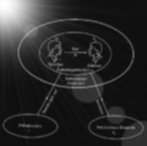|
Hier
finden Sie eine Liste von Themen, die wir gerne im Semester besprechen
würden. Die farblich hervorgehobenen Texte
sind zentrale Seminartexte, die möglichst von allen Seminarteilnehmern
gelesen werden sollten. Die einzelnen Unterkapitel sind dabei zusammenhängende
Themenblöcke, die möglichst in einer (alleine oder im Team angefertigten)
Seminararbeit behandelt werden sollen. Die Seminararbeiten sind vor
dem Wintersemester in den Semesterferien anzufertigen und müssen
spätestens zwei Wochen vor Ihrem Referatstermin vorliegen. Die Arbeiten
sind im ausgefertigten Zustand abzugeben (keine Rohfassungen, etc.).
Im
Seminar wird ihre Semesterarbeit an die anderen Kommilitonen eine Woche
vor ihrem Referatstermin verteilt, ihr Referat besteht dann in einer fünfminütigen
Zusammenfassung der Ergebnisse ihrer Arbeit. Daran anschliessend wird im
Rest der Sitzung Ihre Arbeit zusammen mit Ihren Kommilitonen
diskutiert.
Die
Richtlinien für das Abfassen einer Hauptseminararbeit finden sie hier.
Neben der Note Ihrer Hausarbeit geht auch Ihre Beteiligung während des
gesamten Semesters, ihr Kurzreferat und Ihr Verhalten während der
Diskussion Ihrer Arbeit mit in die Gesamtbenotung Ihrer Leistung ein.
1.
Two
Traditions
of
Information Theory
1.1
Syntactical Approach
1.1.1
Hartley: "The Transmission of Information"
1.1.2
Shannon: "The Mathematical Theory of Comunication"
1.1.3
Cherry: "The Communication of Information"
1.1.4
Weaver: "Recent Contributions to the
Mathematical Theory of
Communication"
1.2
Semantical Approach
1.2.1
Popper: "Logic of Scientific Discovery" (esp. chapter 6)
1.2.2
Bar-Hillel/Carnap: "An Outline of A Theory of Semantic
Infomation"
1.2.3
Bar-Hillel: "An Examination of Information Theory"
1.2.4
Bar-Hillel: "Semantic Information and its Measures"
2.
Hintikka,
Possible
Worlds, and Information
2.1
Hintikka: "On Semantic Information"
2.2
Hintikka: "Surface Information and Depth Information"
2.3
Hintikka:
"An Analysis of Analyticity"
2.4
Hintikka: "Are Logical Truths Tautologies?"
2.5
Hintikka: "Kant Vindicated"
2.6
Hintikka: "Information, Deduction, and the A Priori"
2.7
Hintikka: "Knowledge, Belief, and Logical Consequence"
2.8
Hintikka: "Impossible Possible Worlds Vindicated"
3.
Dretske
and the Flow of Information
3.1
Dretske: "Knowledge and the Flow of Information" (Buch, Kapitel
2,3,5)
4.
Situation
Semantics
Takes Over
4.1
Barwise: "Scenes and other Situations"
4.2
Barwise/Perry: "Situations and Attitudes" (Buch)
4.3
Barwise/Perry: "Situations and Attitudes"
4.4
Barwise: "Information and Semantics"
4.5
Soames: "Lost Innocence"
4.6
Hintikka: "Situations, Possible Worlds, and Attitudes"
4.7
Barwise/Perry: "Shifting Situations and Shaken Attitudes"
4.8
Perry: "Semantics, Situation"
5.
Mathematization
I: Devlin
5.1
Devlin: "Logic and Information" (Buch, Kapitel
1,2,8)
6.
Mathematization
II: Barwise/Seligman
6.1
Barwise/Seligman: "Information Flow" (Buch, Kapitel
1-3)
6.2
Barwise: "Constraints, channels, and the flow of information"
6.3
Barwise/Etchemendy: "Information, infons, and inference"
6.4
Seligman: "Perspectives in Situation Theory"
6.5
Seligman: "Physical Situations and Information Flow"
6.6
Barwise: "Information and Impossibilities"
6.6.1
Stalnaker: "Inquiry" (esp. chapter 3)
7.
Making
it Applicable
7.1
Perry/Israel: "What is Information?"
7.2
Perry/Israel: "Information and Architecture"
7.3
Perry: "Knowledge, Possibility, and Consciousness"
7.4
Perry/Israel: "Fodor and Psychological Explanations"
7.5
Perry/Israel/Tutiya: "Executions, Motivations, and
Accomplishments"
7.6
Perry/Macken: "Interfacing Situations"
7.7
Perry/Israel/Macken: "Prolegomena to A Theory of Disability"
8.
New
Trends and Developments
8.1
Floridi: "Is Information Meaningful Data?"
8.2
Floridi: "Outline of A Theory of Strongly Semantic Information"
8.3
Devlin: "InfoSense: Turning Information into Knowledge"
|
